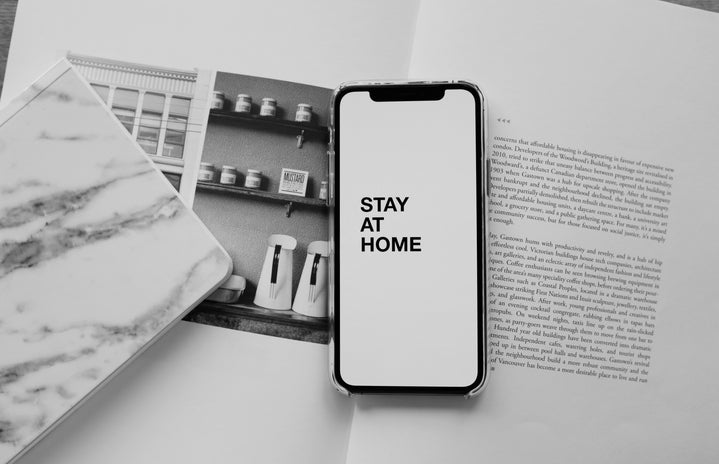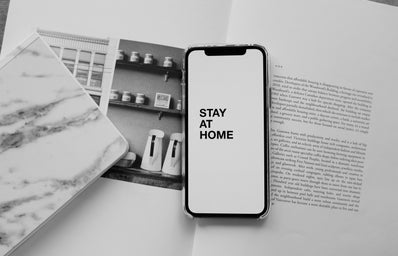As someone who’s struggled with on-and-off depression and anxiety for several years, I really thought that by now I’d be prepared to battle the seasonal depression that hits every winter. But every year without fail, the combined pressures of academic burn-out, finals approaching, and the dreariness of the 6 p.m. dark skies hit me with a slew of symptoms.
For one, it becomes really hard to leave my bed.
In the cold, winter months, I spend a lot more time to myself – moping, staying inside, or what I like to excuse as “recharging.” Arguably too much. I try to excuse it as self-care time, and that I get cold outside (my bed is extra cozy in the winter for some reason) – but these excuses keep me in a cycle of laziness, inactivity, lack of productivity, and keep me away from the activities that make me happy.
While recharging and self-care time are very essential to upholding one’s mental health, especially when you are experiencing symptoms of burn-out due to work, school, or emotional pressures – it is easy to get trapped in that comfort zone. Personally, I too often let that get ahead of my productivity and I become much more inactive.
I go to work and come straight home because I’m tired. I go to campus and come straight home after class because I’m tired. I might even miss class sometimes. I bought tickets for a game months ago and it’s coming up? Better stay home the day before so I have energy on the day of. I miss out on family dinners. My friends are going out next Friday? Cool, means I’m not going out to eat until then. My days become a cycle of counting down the moments until I get to be alone in my room, where I’m comfortable, warm, and can do anything I want or need with my phone or laptop.
I complete my most necessary ‘tasks’, and allow myself a break for things I don’t see as a priority. However, when I do that, I strip myself from most of the activities that help me thrive and stay mentally healthy – working out, going out with my friends, enjoying the sun (the sun comes out in winter too), spending time with the people I love, exploring and going out. The list goes on. I don’t allow myself to be spontaneous or allow good things to come to me, even though realistically I know that I can’t complete my daily goals from my bed. Furthermore, I definitely can’t achieve all the things I want out of life by scrolling through Twitter while on Facetime 24/7.
Reminding myself of this and being self-aware can be especially challenging when you are so emotionally overwhelmed and stressed, which is why it is important to incorporate breaks into your schedule. To prevent myself from staying lazy (I’m a Taurus, it’s not easy), I try to plan the week for myself and write out my daily routine and tasks. This way, I can incorporate and block in activities that are beneficial for my mental health – like spending time with friends, self-care time (whether that is physical through doing my nails or hair, or just taking a mini-break from life), or going to the gym – as well as include tasks that I need to fulfill for the day, like homework, going to work, study time, meal time, etc. This allows me to block out time for work and play, yet still leave time for myself to recharge throughout the day – even if it’s just 10 minutes to grab some food, or a quick phone call with a friend or family member, or just a few minutes to lay on my bed and breathe. The achievement of crossing something off my daily task list is really validating, helps motivate me to move on to my next task, and lets me feel less guilty about taking breaks throughout the day.
It is not wrong to recharge and take time for yourself, but staying in bed and moping too often usually leads to further anxiety and depressive symptoms. Make sure to take care of yourself while staying productive this winter! Stay on top of your eating and water intake – you can’t be productive without energy. Of course, get your sleep – but try not to let yourself get trapped in an excess of it. Push yourself to get up and start your day, but don’t overdo it when you know you just need a break. Stay on top of your hygiene and self-care routines. Make sure to go outside and get Vitamin D (don’t forget to wear your sunscreen, even in the winter months). Talk to your family and friends about what you’re feeling – it’s not easy to overcome feelings of hopelessness and despair in the winter, but talking about it helps you see that you are not alone in your experiences and you will often walk away from the conversation feeling better. Most importantly, keep reminding yourself that all hard times will pass and that you are capable of taking care of yourself while getting your things done.


